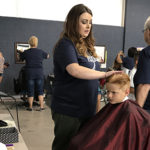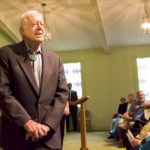WACO—Relationships between churches and schools are less about money and more about mentoring, said Diana Garland, dean of Baylor University’s School of Social Work.
Diana Garland, dean of Baylor University’s School of Social Work.With students and teachers headed back to the classroom, it’s the time of year when many congregations engage with local schools, and Garland believes churches need to consider carefully their approach to school ministries.
She offers these tips:
• Consider service rather than simply sending money.
“It’s easy to write a check,” Garland said. “It’s a lot harder to spend an hour a week to help a kid learn to read. Both are important, but the latter is often more meaningful.”
Churches can collaborate with school officials to do a number of things—from upgrading facilities and organizing events to staffing mentoring programs and praying with teachers.
The impact of this type of service is twofold, she said. The people on the receiving end can benefit, and those who serve can grow in their faith.
“Our research shows that the most effective way to grow the faith life of Christians is to engage them in meaningful service to others,” Garland said.
“We were surprised to find that service is more effective than any other single approach to faith development—including attending worship study groups and Bible study groups. Of course, that doesn’t mean that worship and Bible study are unimportant. They are. But without service, they are insufficient in growing a lasting faith.”
Sign up for our weekly edition and get all our headlines in your inbox on Thursdays
• Don’t assume you know the needs of the school.
“We bring our sense of calling, but then it’s time for our church to sit down and say, ‘We want to help but we don’t know how.’ We need to be respectful and understand that we don’t have the answers and that we need to collaborate,” Garland said.
For example, churches that collect school supplies for classrooms might incorrectly assume felt-tip markers would be helpful, but a conversation with teachers and administrators could reveal the school doesn’t permit students to use felt-tip markers. Instead, the school might need its cafeteria painted or assistance in providing uniforms, she said.
• Think relationally.
“Relationships are the most important and profound gift we can give,” Garland said. “As important as school supplies are, they are even more effective when they come from people who know the people, know the children.
“There is nothing more powerful than service that builds an ongoing relationship between two people, which is why tutoring and mentoring and befriending are so valuable.”














We seek to connect God’s story and God’s people around the world. To learn more about God’s story, click here.
Send comments and feedback to Eric Black, our editor. For comments to be published, please specify “letter to the editor.” Maximum length for publication is 300 words.